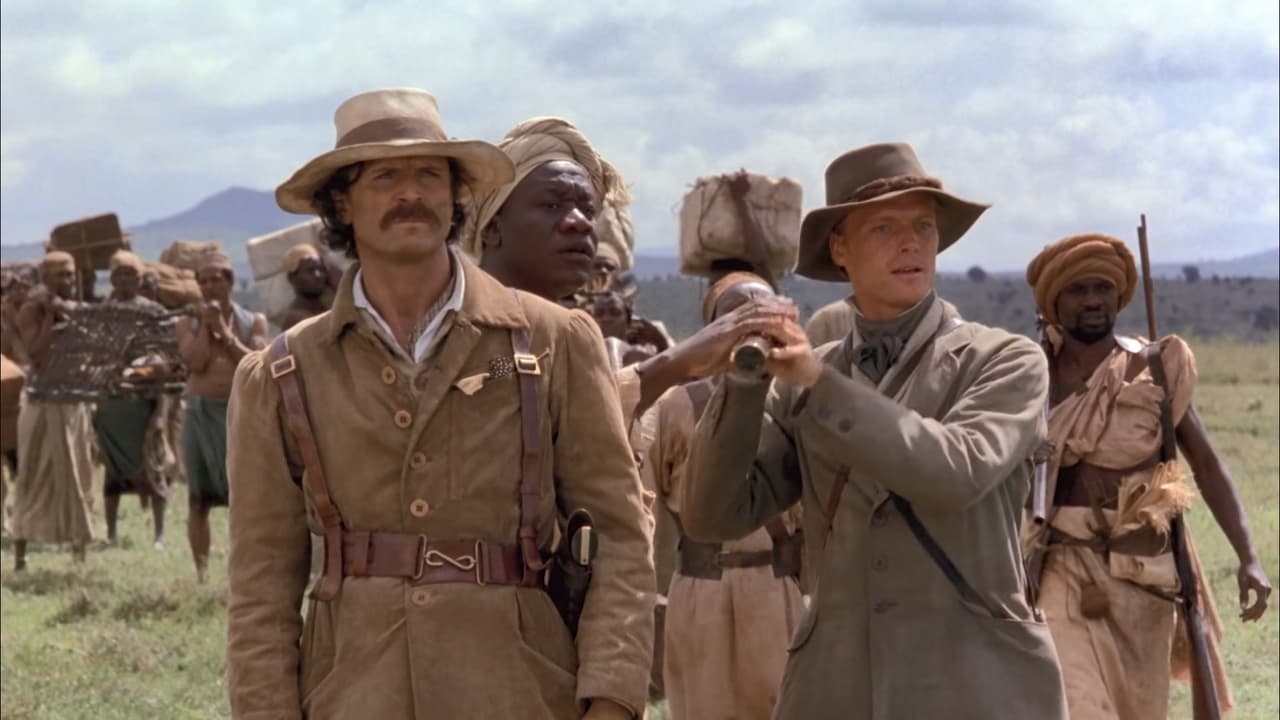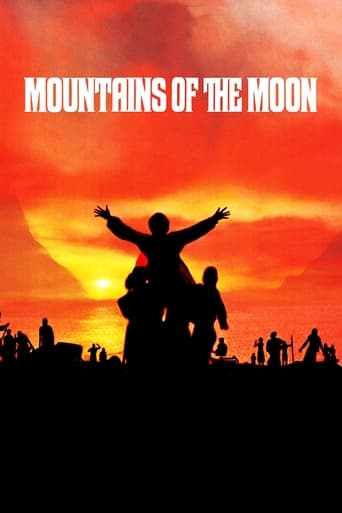

SERIOUSLY. This is what the crap Hollywood still puts out?
... View MoreI am only giving this movie a 1 for the great cast, though I can't imagine what any of them were thinking. This movie was horrible
... View Morean ambitious but ultimately ineffective debut endeavor.
... View MoreI enjoyed watching this film and would recommend other to give it a try , (as I am) but this movie, although enjoyable to watch due to the better than average acting fails to add anything new to its storyline that is all too familiar to these types of movies.
... View MoreThis tale's uniquely distinctive feature is its vivid portrayal of the life and environment of the natives and other tribes inhabiting, or trading in, central Africa during the 19th century.The film was shot by Roger Deakins, who has been nominated thirteen times for an Academy Award for his cinematography, and amazingly has never won. He must be the greatest living exponent of his art. He also had unusual early experience of filming African landscapes.This treatment of the story of Burton and Speke, and their search for the source of the Nile river, has left several viewers, including me, avidly wanting to know more about their relationship, whether Speke committed suicide in 1864, and the fundamental reasons for their apparent falling out. On balance, Burton is presented here as the wronged party, but other factual accounts seem to me to tend to favour Speke, because of Burton's difficult and eccentric personality. His wife, Isabel, was exceptionally devoted, and she is played here by Fiona Shaw, who resembles her strongly in appearance.There is little doubt that Burton was the more remarkable human being of the two, but the question remains open, and it appears that the credit for actually first establishing the source of the Nile must go to Speke. It was ultimately firmly confirmed by Stanley.There is a conflict between Speke's obsessive Victorian imperialism, and Burton's equally obsessive but more academic interest in the world's varieties of communication and ethnicity. Speke names his lake Victoria, but Burton names his lake Tanganyika. A fine film, but the actual facts are worth checking, even if they resolve nothing.
... View MoreI don't think I see, anywhere, in comments about the historical accuracy of this movie, the glaring error: Sir Richard Francis Burton was most certainly NOT Irish and would not have spoken in an Irish accent. For me this really undermines things. Why do all the work and effort, just to get something so elementary wrong from the go-get? Of course, since my initial interest in this great character is from Mark Hodder's epic "Burton and Swinburne" adventures, in which Burton inhabits a steam-punked Victorian world of genetically modified people, clockwork men and so much more, I have little claim for accuracy maybe. Except to say since this film purports to give an account of the man, misidentifying his very nationality seems like shoddy work. OH MY-Now Oliphant just stated Speke is English and Burton is not....WHAT is going on here?!Not good enough, sorry.
... View MoreIf we hope to be educated by film, Mountains of the Moon shows us why that's a slippery slope. Bob Rafelson wanted to make this film for years but he takes liberties about key things, so that means he was looking to tell a very specific story about two people, rather than evoke something of the reality of European exploration in Africa. This is romantic, classical, storytelling. For example:Speke is shown to hesitate when he returns to England before he goes before the Royal Geographical Society, no doubt to show him as a pawn used by his publishers who hope to make a fortune on his findings. In reality Speke hastened back to England.In the end we're told that Speke's theory that Lake Victoria is the source of the river Nile is correct. In reality, the White Nile flows out of a system of lakes in the region, which would mean that Richard Burton's theory was correct. But Speke's betrayal of his friend in the film is so alienating for his character, that his committing suicide is not atonement enough. The film also feels the need to vindicate his theory post mortem.What this means is that Mountains of the Moon takes liberties with fact, but does so in the interest of likable, well-rounded, characters. A lot of the drama is riveting. There's good and bad in them and Speke is not allowed to become the villain. That reveals Bob Rafelson's method here; there's too much 'film' in Mountains of the Moon. Africa is a central character in the same inescapable way the desert is prominent in Lawrence of Arabia, it shapes and moulds the people and spits them back out in Victorian England scarred and tattered, but this story of loyalty, friendship, and betrayal, almost takes place apart from Africa. Rafelson doesn't have the affinity for the mysteries of a new world, at once horrible and wonderful, the capacity to be at awe, as Herzog in his jungle films or Coppola in Apocalypse Now. The landscape is there but Rafelson doesn't quite know what to do with it. He shoots it like it's a studio backlot. The African desert is there but it doesn't have a presence. When the expedition sets off for the interior of Africa, we get bouncy 'adventure' music in upbeat tempos.Then we're taken captives by a local chieftain and the movie takes a turn towards something that reminds me of Cobra Verde, where Klaus Kinski suffers a similar fate off the West African coast, and Cabeza de Vacas, where the sole survivor of a conquistador expedition is held by Mexican indians, elaborate rituals and peculiar ceremonies introduce us to a strange world where ornate violence is at the heart of everything. Rafelson is still doing a movie in the classical sense of the term though, and for that movie little has changed since the 60's when British colonial interests in the area where again depicted in the historical epic Khartoum.If Terrence Malick is filled with lyrical wonder at everything around him in his tale of the settlement of New England in The New World, Bob Rafelson is the complete opposite, he's too banal about the Nile expedition in Mountains of the Moon. En route we get some great images, like the slavetrading party Burton and Speke happen upon. Victorian maps showed the area as a blank spot of terra incognita, but Arab slavetraders had filtered for centuries millions of slaves through to Zanzibar and knew those places. But they're never unforgettable images to burn themselves in my memory. Rafelson's way of making this film is too prosaic for that. Everything else is mostly simplified and simplistic. This is still the type of film where a voice-over narrating a journal takes us through the various steps of a journey. It's not special enough.
... View More"Mountains of the Moon" is the kind of epic that seems to need a director like Bob Rafelson. I hoped this would be his "Lawrence of Arabia," but something goes amiss in the construction of the drama which Rafelson coauthored. For instance, we learn more about the two protagonists in two single lines than the 40 minutes that begin the film: Speke: (asking permission to organize some specific details of setting up an expedition in to the interior of Africa) responds, "I already have"; and for Burton: (a voice over) "Dear Isabelle ." The meandering, surprisingly cruel, first 40 minutes of the film become irrelevant.Speke and Burton's search to find the source of the Nile is great material for a film. The scenery alone would lead any director to jump at the chance, but as so often occurs with films about Africa, the Continent overpowers the human drama. Rafelson is a master of human intimacy, and this story of two men's friendship which turns to rivalry is badly mangled by the screenplay. Burton's life alone is a huge trove for the subject of a film, and Rafelson seems to never grip the nature of these men, the essence of the story nor how to tell it.Yet, the film is worth spending time with only to lavish in the effort of these two men and perhaps the last time when "discovery" meant a places on a map.
... View More